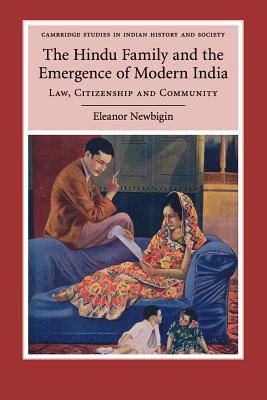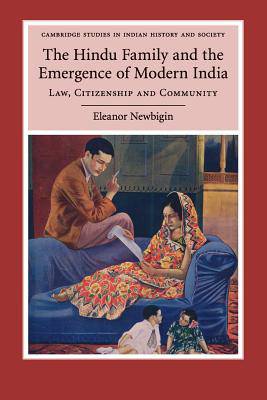
Je cadeautjes zeker op tijd in huis hebben voor de feestdagen? Kom langs in onze winkels en vind het perfecte geschenk!
- Afhalen na 1 uur in een winkel met voorraad
- Gratis thuislevering in België vanaf € 30
- Ruim aanbod met 7 miljoen producten
Je cadeautjes zeker op tijd in huis hebben voor de feestdagen? Kom langs in onze winkels en vind het perfecte geschenk!
- Afhalen na 1 uur in een winkel met voorraad
- Gratis thuislevering in België vanaf € 30
- Ruim aanbod met 7 miljoen producten
Zoeken
€ 64,95
+ 129 punten
Uitvoering
Omschrijving
Between 1955 and 1956 the Government of India passed four Hindu Law Acts to reform and codify Hindu family law. Scholars have understood these acts as a response to growing concern about women's rights but, in a powerful re-reading of their history, this book traces the origins of the Hindu law reform project to changes in the political-economy of late colonial rule. The Hindu Family and the Emergence of Modern India considers how questions regarding family structure, property rights and gender relations contributed to the development of representative politics, and how, in solving these questions, India's secular and state power structures were consequently drawn into a complex and unique relationship with Hindu law. In this comprehensive and illuminating resource for scholars and students, Newbigin demonstrates the significance of gender and economy to the history of twentieth-century democratic government, as it emerged in India and beyond.
Specificaties
Betrokkenen
- Auteur(s):
- Uitgeverij:
Inhoud
- Aantal bladzijden:
- 280
- Taal:
- Engels
- Reeks:
- Reeksnummer:
- nr. 22
Eigenschappen
- Productcode (EAN):
- 9781316648568
- Verschijningsdatum:
- 11/05/2017
- Uitvoering:
- Paperback
- Formaat:
- Trade paperback (VS)
- Afmetingen:
- 152 mm x 229 mm
- Gewicht:
- 376 g

Alleen bij Standaard Boekhandel
+ 129 punten op je klantenkaart van Standaard Boekhandel
Beoordelingen
We publiceren alleen reviews die voldoen aan de voorwaarden voor reviews. Bekijk onze voorwaarden voor reviews.









